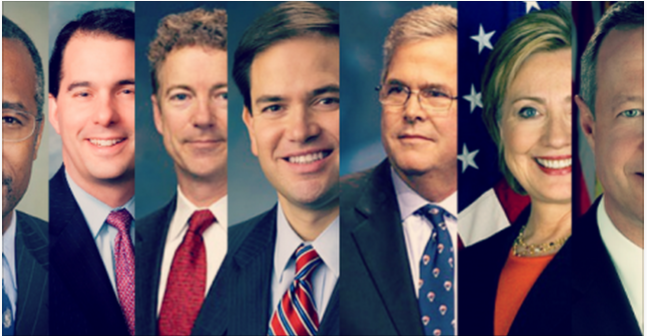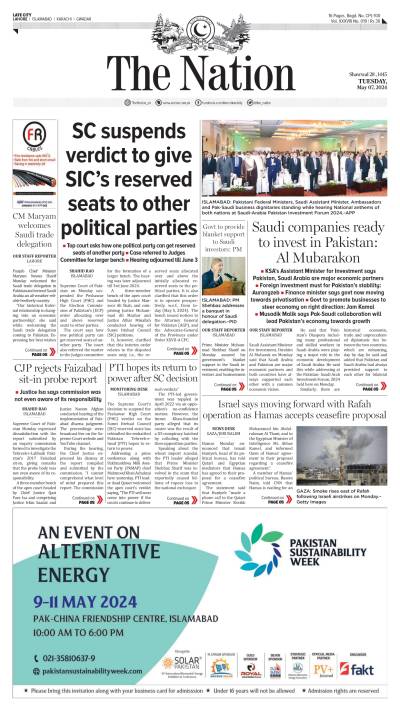WASHINGTON: One of the front-runners in the Republican presidential race said Thursday he would “absolutely” want a database of Muslims in the country and wouldn’t rule out giving them special ID cards that noted their religion.
Another top candidate likened Syrian refugees, who are largely Muslim to dogs. Some of them might be rabid, he said, which was reason to keep them all out.
And a third stood up in the Senate on Thursday and called for banning refugees from five Middle Eastern countries. He was explicit that the point was to keep Muslim refugees out while letting Christians from the same places in.
A week after terrorists tied to the Islamic State terrorist group killed 129 people in Paris, some Republican politicians have responded with the kind of rhetoric that another Republican — George W. Bush — explicitly avoided after the al-Qaeda attacks of Sept. 11, 2001. In the angry aftermath, Bush said that “Islam is peace” and that all Muslims should not be judged for the deeds of a few radicals.
But in this election , already defined by a suspicion of government and anger about immigration, the rhetoric on Muslims has become a dominant feature of the Republican response to the attacks. It also comes as 47 House Democrats joined with 242 Republicans on Thursday to pass a bill placing new security constraints on President Obama’s pledge to admit 10,000 Syrian refugees, most of whom would be Muslim.
Some Republican presidential candidates have said they would go further and argue that all Muslims should bear greater scrutiny because it is too difficult to tell which ones are the radicals.
“If there’s a rabid dog running around in your neighborhood, you’re probably not going to assume something good about that dog, and you’re probably going to put your children out of the way,” retired neurosurgeon Ben Carson said Thursday in Mobile, Ala.,when he was asked about Syrian refugees. “It doesn’t mean that you hate all dogs by any stretch of the imagination, but you’re putting your intellect into motion.”
Such rhetoric from candidates who would lead the Republican Party has been loudly condemned by Muslim groups and politicians.
“It’s unacceptable, and if we have somebody running for president they’re going to be president for all people,” said Rep. André Carson (D-Ind.), one of two Muslim members of Congress. “We can’t have candidates painting a group of people with a broad brush, and that’s exactly what they’re doing.”
The growing suspicions about Muslims have not been limited to presidential candidates. In one particularly vivid example, Sid Miller (R) — the elected agriculture commissioner in Texas — likened Syrian refugees to rattlesnakes. “Sure some of them won’t [bite], but tell me which ones so we can bring them into the house,” Miller wrote in a Facebook posting.
And Hillary Clinton’s top political patron, entertainment titan Haim Saban, called for “more scrutiny” of Muslims for ties to terrorism.
Saban later issued a statement saying that he regretted making a “religious distinction as opposed to a geographical one,” saying he favors scrutiny of people from countries where the Islamic State has strongholds.
Donald Trump, who has suggested closing down mosques and increasing surveillance of Muslims, said in an interview with Yahoo News published online Thursday that “we’re going to have to do certain things that were frankly unthinkable a year ago.”
When pressed on whether such measures might include tracking Muslim Americans in a database or noting their religious affiliations on identification cards, Trump said: “We’re going to have to — we’re going to have to look at a lot of things very closely. We’re going to have to look at the mosques. We’re going to have to look very, very carefully.”
Later Thursday, Trump told NBC News that he would “certainly” and “absolutely” create a database of Muslims in the United States, although it was unclear whether this system would track only newcomers to the country or all Muslims living in the country.
“There should be a lot of systems beyond databases,” Trump said. “I mean, we should have a lot of systems.”
Two other candidates — Sen. Ted Cruz (Tex.) and former Florida governor Jeb Bush — suggested this week that the United States should accept Christian refugees from Syria but not some or all of the Muslim refugees.






